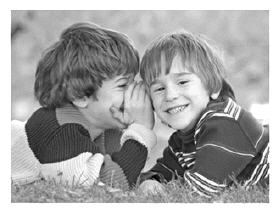As an adult child of divorce, at times I wish my marriage had survived until my sons were grown. I imagine they would have been spared pain. Then again, knowing what I know now, I believe they will be better off in the long run because it was I who raised them.
 My own parents divorced after 30 years of a bumpy road. I recall my mother’s unfathomable anger as I was growing up; she was a beautiful and brilliant woman who suffered, and I’ll never know why. She unleashed her unhappiness on anyone in proximity. I was the brunt of her discontent from the time I was a child, listening to her bitch about my father, rant from some deep place of hurt, and sob at the kitchen table.
My own parents divorced after 30 years of a bumpy road. I recall my mother’s unfathomable anger as I was growing up; she was a beautiful and brilliant woman who suffered, and I’ll never know why. She unleashed her unhappiness on anyone in proximity. I was the brunt of her discontent from the time I was a child, listening to her bitch about my father, rant from some deep place of hurt, and sob at the kitchen table.
Her troubled state was surely exacerbated by a disappointing marriage, but I’m convinced her issues were far more complicated.
Would I have been better off had she dumped the marriage early on, or if my father had?
My dad was rarely at home; he traveled for work – one of the reasons I vowed to myself that if I ever married (and I was in no hurry to do so), my spouse couldn’t be a traveling man.
The irony? He was, though he traveled little when we dated. One year into marriage, that increased markedly and the strain of it – for me at least – worsened over time.
Timing of Divorce
My sons were in elementary school when I divorced and the changes that followed were dramatic – I lost my paying job, we lost our home, their father was living hundreds of miles away, there was no other family around. Financial and medical issues plagued us. My younger son required a long period of grieving – and my patience. He was slow to put the pieces back into something workable.
Would timing have made a difference? If they had been younger? Older? If the marriage had been held together until they flew the nest?
I used to ask my own mother – often and plaintively – If you’re so unhappy, why don’t you get a divorce?
I asked as a 12-year old and repeatedly as a teen. To me, as I couldn’t imagine that it might mean losing our home or changing schools (often the consequence of divorce these days), I naively assumed she would be happier. And if she was happier, she might be less angry with me.
From where I sit, I doubt that would’ve been the case. When my parents finally divorced, my mother’s bitterness deepened and she seemed unhappier still; my father quickly built himself a new life and in his happiness, he was able to reach out to me in ways he couldn’t when I was younger.
Adult Children of Divorce
An interesting article caught my eye – on adult children of divorce. Erica Manfred, author of He’s History, You’re Not, makes a case for recognizing the pain and confusion that divorce wreaks on kids, no matter what their age. She writes:
Adult children suffer a series of intense losses as a result of parental divorce. They lose their family as it has been and will never be again… Adult children will re-evaluate their childhoods in the light of the divorce, and come up with different versions of who they were and who they are now. They often start questioning the point of marriage and become more leery of dating and making a commitment.
Issues of Marriage or Issues of Divorce?
A series of intense losses?
 That wasn’t my experience, though I don’t doubt it may be for others.
That wasn’t my experience, though I don’t doubt it may be for others.
Wariness when it comes to relationship?
Certainly, my reticence in marrying resulted from observing my parents, but I suspect it was the 30 years of their uneasy union – not the divorce – that made me question my own capacity to choose wisely and love well.
My experience of my parents’ divorce was a non-event. My mother continued to grumble about her life, but my father welcomed me into his. There was relief, there was affirmation that I hadn’t imagined the tension in our home, or for that matter – my mother’s crazy moods.
Ultimately, divorce inflicts suffering on those involved – in varying ways and to varying degrees. I believe the collective costs to society are gargantuan.
But marriage also causes harm, or rather, those who are married may cause harm to each other and their children. And this is where we find ourselves in a cultural (and legal) muddle. One with tentacles into so many areas of society that I can’t begin to dissect them all. So how do we solve the problem of divorce? Or is the real challenge dealing with the dilemma of marriage – and the process and consequences of divorce – separately?
Concepts of Home
Alluding to the heartache that even adult children experience when parents divorce, Manfred references the pain of losing one’s sense of home. She writes:
Robert Frost once said, “Home is the place where, when you have to go there, they have to take you in.”
 I love the sentiment, and for some it may be true. But even this is not my experience. There was a time when I needed to be taken in, and my mother did anything but welcome me. There were other times when she metaphorically and effectively barred the door.
I love the sentiment, and for some it may be true. But even this is not my experience. There was a time when I needed to be taken in, and my mother did anything but welcome me. There were other times when she metaphorically and effectively barred the door.
I can only guess this plays into my personal concept of home, which is fluid at best and at times, insufficient.
When it comes to my sons, I hope I succeeded in creating something akin to Robert Frost’s vision – both a place, and an emotional vessel.
Cutting the Cord
As I observe my young men and reflect on their journey and my own, cutting the cord takes on new meaning. It captures the need for the parent to disengage from the child, so the child can freely become the adult. It is the child knowing he can assume independence without guilt, able to retain safe passage to a loving parent whenever he or she is needed.
Perhaps cutting the cord is also about taking distance from memories – those we constantly rework and reinterpret, those that grow kinder, those that grow clearer. We must accept that there is no changing the past, though we may use it, find grace, and continue moving forward.
Would my children have been better off if divorce had come 10 years or more later? I have mixed feelings. But I’ll never know.
Would I have been better off? Again I have mixed feelings; I’ll never know.
Did my mother choose the lesser of two evils by staying married for 30 years? Ultimately I believe she was protecting her children with an awareness I could not have had when I asked why she didn’t divorce. Was I better off than I realize? Was she?
Once again, I’ll never know.
You May Also Enjoy
Wow. This post demonstrates that the questions themselves are important, especially if there are no answers.
Well thought, well written.
Fathers (or nowadays, either parent) having to be away from their family for extended periods is very difficult. Having two parents gives balance and perspective, both for the parents and for the children. Of course, there are times when one parent is so disturbed that separation is necessary for the survival of the others. I’m grateful that my parents were together every night and that my work was always five miles up the road. There were occasional conferences, but I called every night at bedtime when the children were younger (would embarrass a high-school student).
This is a fascinating essay on an intriguing question – and one that I believe has many “right” answers, depending on the people involved.
My husband’s parents divorced when he was a freshman in college. All things considered, the dissolution of their marriage was easier on him than it was on his younger sisters. My father’s parents divorced when he was an adult. Their split held tremendous ramifications for him, but it didn’t cripple him. Meanwhile, my mother’s father left the scene when she was still a girl. Luckily, her mom had a strong support network of extended family to help her and to lessen the trauma on my mother and her brothers.
All in all, my first instinct would be to say that divorce is easier on grown children, but then I think about the corrosive effects on a family of two people staying together when they’d be better off apart and I’m torn again. There is no right answer.
“There is no right answer.”
Perhaps this is exactly why we need to keep the questions in mind – and the “best interest of the children” is never crystal clear, as you point out with your examples, Kristen.
You make a very clear point – there will be hurt whether parents stay in an unhappy marriage or choose to get divorced. And, no matter what, the path not taken will always remain a mystery. So what is one to do?
I think we go with our gut, Cathy. But if we’re able, we take the time to gather all the information that is pertninent, and often that is a matter of asking questions – very detailed questions – that we wouldn’t know to ask. I believe the repercussions financially are dramatically different for both parents when they divorce with grown children. But the quality of life – emotional and otherwise – no way to say.
My parents divorced after 23 years of marriage when I was 22 years old. I’m not sure which is better; to divorce when the kids are young, or when they are older. As an adult, I couldn’t understand why they didn’t want to try and work through their communication problems. Younger children sometimes turn the divorce internally, thinking it was something they did to cause it. In either case, there is fallout. My mom wanted the divorce but continued to act depressed and needy. My dad remarried before my mom, which didn’t help matters at all. Divorcing with children in the fray is always messy. There isn’t any hard and fast rule how to do it. I think everyone just makes it up as they go, based on the circumstances at hand. And hope/pray the kids come out okay.
I think when two people know a marriage is over, it should be over. I have a friend whose parents waited until the kids were both out of high school to divorce. It devastated him. His world was completely shaken by it. His sister (younger) was simply relieved for them. But he was not prepared at all. When people act, some people buy it, and some don’t. I think we have to do what’s honest and real. That’s not to say it won’t hurt, but dealing with things truthfully has to be better than the alternative.
Never having experienced divorce, I can’t offer much in the way of wisdom. But what I do know is that it must be very difficult for children to live in a home filled with tension and unease. To me there is a lot of value in teaching children how to manage change, and to recognize the importance of their parents happiness even if it comes at the price of other things. Does that make it easy, I wouldn’t for a moment think so, but over the long term, I believe it makes it healthier.
When I began reading this post, my first thought was the movie ‘Secrets of the yaya sisterhood’ – Have you seen it?
My parents are still together after 45 years. As I divorced (when my kids were young) not of my choice, I felt the guilt for not making it work as my parents did. I am not sure there is a RIGHT age to suffer the effects of a divorce. However, I think it is the bad marriage which causes the most scars. My children are not angry or hurt by the divorce at all. But they ARE hurt by the way their father treats them (absent). I am sorry that your mother was so hurt and angry for so long, that in itself must have lasting effects on both you and your father. I am sure your boys know they can come home as you have shown them it is safe and unconditional. Great thought provoking post.
I think the questions here are the key, thinking through the ramifications of staying together or not. I am certain no marriage is free of rough patches. Equally, I am sure that when parents are unhappy their children suffer. I think the impact of having support (as Kristen mentioned) is essential too. What is best depends on the marriage, the adults, the children.
And you can never answer those what ifs.
I’m sorry to quote so much, but there’s one from Yeats I like very much:
“We had fed the heart on fantasies,
The heart’s grown brutal from the fare;
More Substance in our enmities
Than in our love;
“Happy ever after” is a bad fantasy on which to base a romance, yet we all do it. So much of the work of relationship involves breaking free from this. I wonder, how many of us who are married hide our spousal conflicts from our children, instead of resolving them in the open?
Great post. My parents divorced when I was in my early 20s, it was shocking! I was shocked how hurt I was when it happened. I didn’t see it coming; I had no idea they had problems. I didn’t even believe them at first. I remember saying, ‘what about our traditions’ ‘what about our family dinners’ ‘what about us’. I felt so hurt. I was so mad at my mom for a long time. I eventually got over it. I can’t believe I took it so personal, but I did, it hurt badly.
I left my husband when my son was 3 and the divorce was final a year later. We tried to make it work, but it wasn’t working. I didn’t want to sit in a marriage filled with so much negativity and problems. I wanted my son to grow up in a healthy, loving, enviroment. I thought that was important. Once I left, I was so happy and just able to give to my son tenfold emotinally. It helped him through his development and we saw him flourish. It was amazing how much our energy transferred to him.
Now, we have worked on being co-parents and just want to give him as much love and support as he needs and more. We just want him to know we are here for him. I’m not sure what else we can do.
I don’t think there is a perfect time, I just think whatever time works for everybody and just being as open about things as you possibly can, given the age of the children and letting them know they are loved.
I’ve never been touched by divorce in any real way. Although I know many marriages that were highly dysfunctional while growing up. In the Asian tradition, my parent’s generation didn’t believe in divorce, so many of the children were subject to the tension and fighting of their Mom and Dad. These children are now grown and still wonder why their parents stayed together. They don’t seem to be satisfied with their parent’s explanation – “We stayed together for the kids.” Often times, these children wished their parents divorced. Tension is palpable no matter how old you are.
My parents never divorced and should have. Not only for my myself and my sisters – but for themselves. My mother died too young and completely unhappy, she kept thinking she’d have time to do what she wanted. She didn’t. Cancer had other plans for her. In my opinion you should never stay together for the children or anyone else if you are truly unhappy. Everyone suffers. My life and my daughters lives changed for the better the day I left my husband twelve years ago. This I know.
I’ll never know either, about so many things. Lovely post.
Thank you, Annie. We just learn to live with what is dealt, and do the best we can, don’t we.